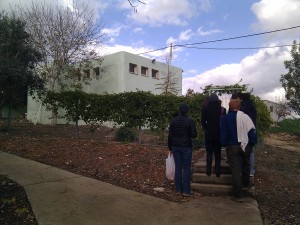⤷ You are here:
🖖︎ Prayers & Praxes —⟶ Praxes —⟶ Immersion (Purification) 🡄 (Previous category) :: 📁 Dreaming 📁 Planting :: (Next Category) 🡆 Sorted Chronologically (old to new). Sort most recent first? The blessing upon preparing one’s hands for attaining a state of ritual purity before a sacred activity. . . . This is the poem “דיא זרשטע טבילה” by Morris Rosenfeld (1862-1923) written sometime before 1898. We have transcribed the poem as it was published in Rosenfeld’s collection of poems Gezamelṭe lieder (1906) pp. 167-168. The poem was romanized and translated into English by Leo Wiener and published under the title, “Die erste Twile (The First Bath of Ablution)” in Songs from the Ghetto (1898), pp. 52-55. A rhyming translation by Rose Pastor Stokes & Helena Frank under the title, “The First Bath of Ablution” was published in Songs of Labor and Other Poems (1914), pp. 72-73. . . . Categories: Tags: 19th century C.E., 57th century A.M., מקווה miqveh, Prayers as poems, predatory gaze, rhyming translation, שמירת הגוף shmirat haguf, Yiddish vernacular prayer Contributor(s): “Tkhine for when a Woman Goes to Immerse in the Mikve” by an unknown author is a faithful transcription of the tkhine published in Rokhl m’vakoh al boneho (Raḥel Weeps for her Children), Vilna, 1910. I have transcribed it without any changes from The Merit of Our Mothers בזכות אמהות A Bilingual Anthology of Jewish Women’s Prayers, compiled by Rabbi Tracy Guren Klirs, Cincinnati: Hebrew Union College Press, 1992. shgiyot mi yavin, ministarot nakeni. If you can translate Yiddish, please help to translate it and share your translation with an Open Content license through this project. . . . Categories: Tags: 20th century C.E., 57th century A.M., balance, immersion, Needing Attribution, Needing Source Images, ritual purity, תחינות tkhines Contributor(s): Basil L.Q. Henriques’s prayer “For Purity” was first published in The Fratres Book of Prayer for the Oxford and St. George’s Synagogue Jewish Lads Club in 1916, and later reprinted in the Prayer Book of the St. George’s Settlement Synagogue (1929), “Special Prayers” section, page 96. . . . “Against Impurity,” a variation of the prayer by Rev. Walter Rauschenbusch, is found adapted (abridged without Christian god-language) by Rabbi Morris S. Lazaron in his World War Ⅰ era prayerbook, Side Arms: Readings, Prayers and Meditations for Soldiers and Sailors (1918), on pages 26-27. The original version of the prayer was first published in For God and the People: Prayers of the Social Awakening (Walter Rauschenbusch 1910), pp. 103-104. . . . This paraliturgical supplement to the blessing over hand washing was written by Jessie Ethel Sampter and published in her Around the Year in Rhymes for the Jewish Child (1920), p. 81. . . . Categories: Tags: 20th century C.E., 57th century A.M., Pedagogical songs, Post-prayer supplements, תפילות קודם התפילה Prayers before Praying, rhyming translation, waking Contributor(s): The following is a meditation I wrote (with the help of my friend Shira Gura, who teaches meditation and Yoga) to be used on Friday before Shabbat at the mikveh. It is based on midrashim related to Shabbat (for example, the notion that we receive an additional soul on Shabbat), as well as meanings behind mikveh in general (for example, the connection between the waters of Creation and the mikveh waters), and on some kavanot (sacred intentions) that came out of the Kabbalah and Ḥassidut movements. There is a strong tradition to write kavanot to use before immersing in the mikveh, since, as Maimonides writes in his Mishneh Torah 11:15, “If a person immerses but without buttressing him or herself [with sacred intention], it is as though he or she has not immersed at all.” . . . This is pre-Shabbos reflection that can be done in a shower or bath. Shabbat is a time when I am less focused on my selfish desires and instead my thoughts drift to my place in the larger community and world. I find myself doing some version of this before Shabbos most weeks and am welcome for the time to reflect on truly what it is to cease from lay work and consider the work that needs to be done to make the world a better place. . . . Categories: Tags: 21st century C.E., 58th century A.M., all bodies, bathing ritual, English vernacular prayer, כוונות kavvanot, North America, shabbat preparation, shower ritual, תחינות teḥinot Contributor(s): A kavvanah for affirming one’s Jewish identity in a mikvah before immersion. . . . Categories: Tags: 21st century C.E., 58th century A.M., affirmations, confirmation, conversion, English vernacular prayer, Jewish identity Contributor(s):
Stable Link:
https://opensiddur.org/index.php?cat=813
Associated Image: (This image is set to automatically show as the "featured image" in shared links on social media.)
Terms of Use:
Be a mentsch (a conscientious, considerate person) and adhere to the following guidelines:
Additional Notes:
Support this work:
The Open Siddur Project is a volunteer-driven, non-profit, non-commercial, non-denominational, non-prescriptive, gratis & libre Open Access archive of contemplative praxes, liturgical readings, and Jewish prayer literature (historic and contemporary, familiar and obscure) composed in every era, region, and language Jews have ever prayed. Our goal is to provide a platform for sharing open-source resources, tools, and content for individuals and communities crafting their own prayerbook (siddur). Through this we hope to empower personal autonomy, preserve customs, and foster creativity in religious culture.
ויהי נעם אדני אלהינו עלינו ומעשה ידינו כוננה עלינו ומעשה ידינו כוננהו "May the pleasantness of אדֹני our elo’ah be upon us; may our handiwork be established for us — our handiwork, may it be established." –Psalms 90:17
| ||
Sign up for a summary of new resources shared by contributors each week
  |

